Featured
- Get link
- X
- Other Apps
California Break And Lunch Laws
If you work over 10 hours in a day you are entitled to a second meal break of at least 30 minutes that must start. In California employees must be provided with a meal break of at least 30 minutes if they work more than five hours in the day.
 California Meal Break Rest Break Laws For 2021
California Meal Break Rest Break Laws For 2021
California requires employers to provide a 30-minute meal break once the employee has worked five hours.
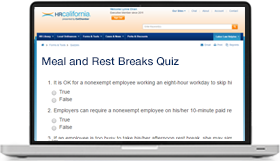
California break and lunch laws. An employer does not have to pay for this time. Under California wage and hour law non-exempt employees must receive a thirty 30 minute lunch or meal break if they work more than five 5 hours in a day. In California a business is not allowed to hire someone without giving them a lunch break every five hours.
Employees who work more than ten 10 hours in a day are entitled to a second 30-minute meal break. If you are a non-exempt California employee you are entitled to a 30-minute continuous duty-free meal break if you work more than 5 hours on a working day under the California meal break legislation which is much more generous to workers than federal labor law. 6 rows California wage and hour law requires employers to provide lunch or meal breaks to employees who.
Yes you can waive your lunch break in California but under one condition you should have worked for 6 hours or less. Rest Breaks and California Overtime. You must be allowed to.
California break law requires employers provide a lunch break every 5 hours. In California the meal and rest break laws are so complex that they have caused confusion among employers. California employees who are considered non-exempt 1 have a legal right to receive meal breaks and rest periods 2 And even most employees who are considered exempt still have a right to take meal breaks but not rest periods 3.
On-duty meal period counted as time worked and permitted only when nature of work prevents relief from all duties and there is written agreement between parties. Learn about your employees rights in California. In other words meal breaks are unpaid.
The meal break must be provided within the first 5 hours of the workday. ½ hour if work is for more than 5 hours per day except when workday will be completed in 6 hours or less and there is mutual employeremployee consent to waive meal period. California employees who are considered non-exempt1 have a legal right to receive meal breaks and rest periods2And even most employees who are considered exempt still have a right to take meal breaks but not rest periods3 The number of breaks depends on the length of the employees shift.
But if your shift ends after 5 hours you have the option of eating lunch after your shift or just going home. Lunch and Break Laws in California Under California labor laws employees working for five hours or more are entitled to an unpaid 30-minute lunch break during that time. The number of breaks depends on the length of the employees shift.
If an employee works more than 10 hours in the same day a second meal period is due. California rest break laws lunch breaks law and meal break laws requires that employees are given a thirty minute break every five hours worked. Under California Law non exempt employees working in California can sign a waiver with their employer stating that they will not take a meal break as long as their shift is less than 6.
A rough guide can be found on the following chart4. California 4. Unfortunately a lot of companies are not comprehensively informed about the California Labor Code and continue to use outdated policies.
California Meal Break Law Requirements If you work over 5 hours in a day you are entitled to a meal break of at least 30 minutes that must start before the. If you have to answer the phone watch the store listen to a presentation or perform any other work related items you are not being given a proper meal break and are entitled to additional pay. This meal period must begin before or at the end of an employees fifth hour of work.
According to the California labor law lunch provision when you are given a meal break you must be completely relieved of all work related duties and be free to leave your work environment. They are entitled to lunch break if they work five or more hours per day. Similar to California overtime laws the lunch break law under California labor laws applies only to nonexempt workers.
If the employees workday will be completed in six hours or less the employee may consent to waive give up the right to a meal break. Because of intentional or accidental non-compliance many businesses have had to deal with expensive litigation. Under California law IWC Orders and Labor Code Section 512 employees must be provided with no less than a thirty-minute meal period when the work period is more than five hours more than six hours for employees in the motion picture industry covered by IWC Order 12-2001Unless the employee is relieved of all duty during the entire thirty-minute meal period and is free to leave the employers.
The employee has the right to waive that meal break if the workday will be no longer than six hours in total. Nonexempt employees include people hired in technical professional mechanical clerical and other related job positions whether paid on commission piece rate salary or other bases.
 California Lunch And Rest Break Laws
California Lunch And Rest Break Laws
 California Lunch Breaks Law Chart Page 4 Line 17qq Com
California Lunch Breaks Law Chart Page 4 Line 17qq Com
Meal Breaks And Rest Breaks A Guide For California Employees
 Is It Legal To Work Through Lunch In California Timesheets Com
Is It Legal To Work Through Lunch In California Timesheets Com
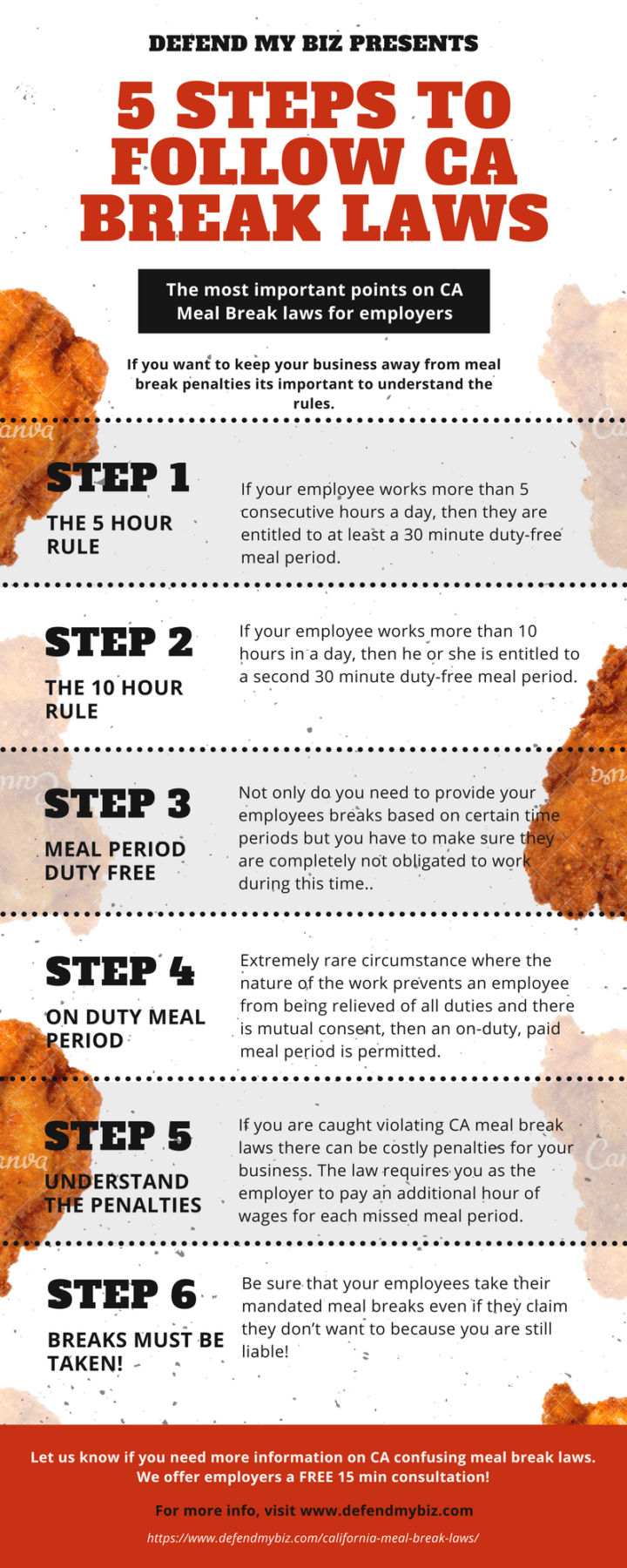 The Employers Guide To Complying With California Meal Break Laws
The Employers Guide To Complying With California Meal Break Laws
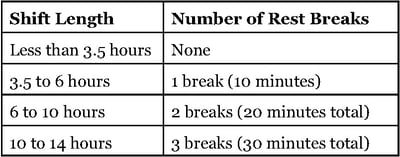 California Labor Laws Meal And Rest Breaks
California Labor Laws Meal And Rest Breaks
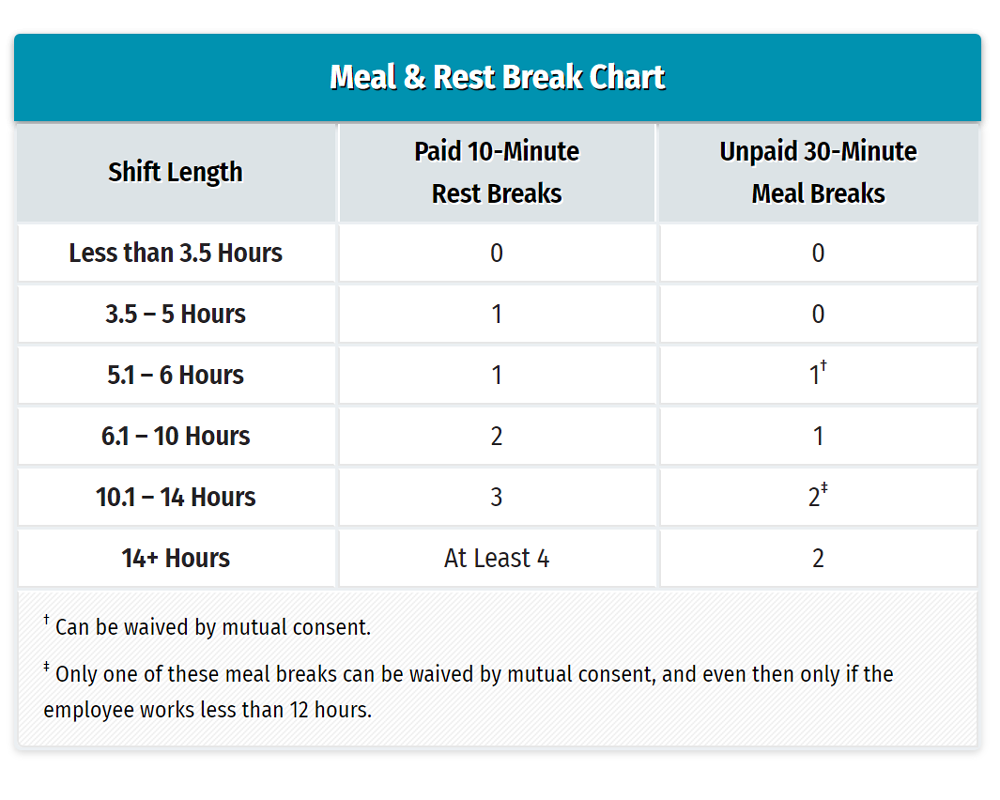 Break Laws In California Meal Breaks Rest Periods 2021
Break Laws In California Meal Breaks Rest Periods 2021
![]() California Meal Break Law 2021 Replicon
California Meal Break Law 2021 Replicon
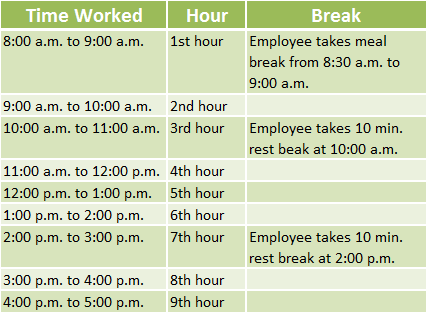 When Do Employers Have To Offer Meal And Rest Breaks Analysis Of Brinker Corp V Superior Court California Employment Law Report
When Do Employers Have To Offer Meal And Rest Breaks Analysis Of Brinker Corp V Superior Court California Employment Law Report
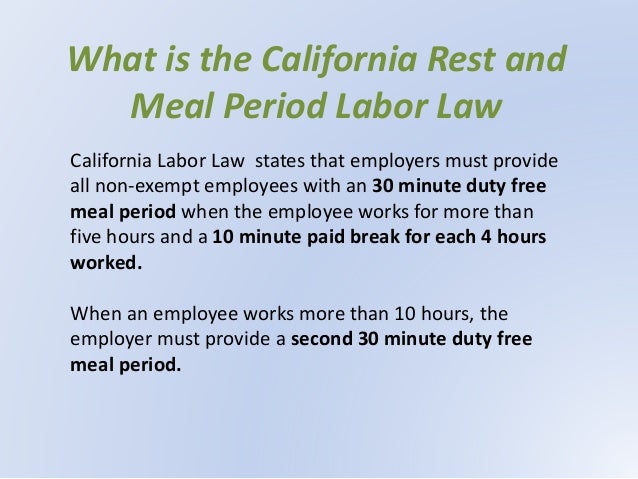 Employee Training On California Labor Law
Employee Training On California Labor Law
 California Lunch And Rest Break Laws
California Lunch And Rest Break Laws
 California Meal Break Rest Break Law 2019 California Chamber Of Commerce
California Meal Break Rest Break Law 2019 California Chamber Of Commerce
 Friday S Five Five Things California Employers Should Not Forget About Meal And Rest Breaks California Employment Law Report
Friday S Five Five Things California Employers Should Not Forget About Meal And Rest Breaks California Employment Law Report
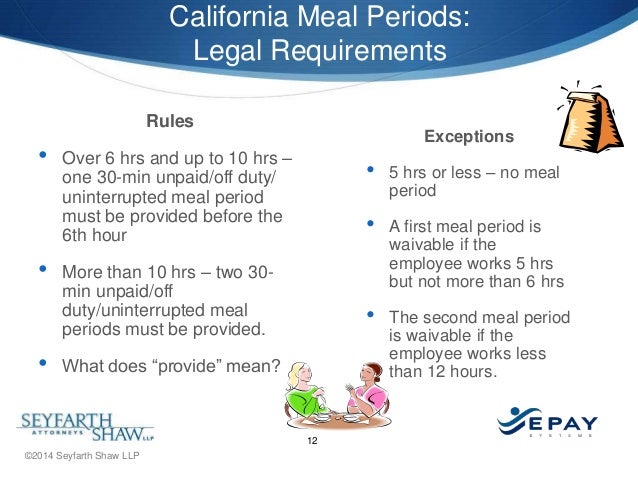
Comments
Post a Comment